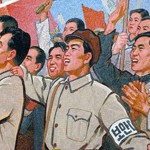Welcome to my class!
This is your homesite and syllabus for “The Rise and Fall of World Communism.” There is no paper syllabus. As we move through the course, I will make regular modifications to the material on this site, depending on my whim and fancy. Therefore, you should read this site on a regular basis to determine whether I have changed any readings, assignments, or schedules. I will invariably forget to mention these during class!
Here is the simple story: There were two great challenges to liberal democracy in the twentieth century— national fascism and world communism. The first was defeated in World War II. In contrast, when Soviet tanks moved into Berlin on May 2, 1945, the second had only begun to take hold. As a result, by the 1980s, there were as many countries in the world that looked like the Soviet Union and the People’s Republic of China as those that looked like the United States and Great Britain. Yet paradoxically, at the point of its greatest impact, communism ceased to be a viable political movement. In the period between 1989 and 1991, almost all the communist-led governments in the world collapsed.
Many observers, including yours truly, were completely surprised by these developments. Should we have known better? Today, it is tempting for those experts who are wiser than this writer to say that, all along, we should have known what was going to happen. Was not world communism destined to fail? Should we not have recognized the rot, corruption, and lies that underlay these regimes’ facade of stability?
The problem with approaches like the one above is that many of the great moments in history seem self-evident in retrospect. For this reason, I take a different approach in this course. I begin with the roots of world communism and ask how the phenomenon looked as the march of events moved forward. This approach allows me to pose four questions:
-
Why did so many intelligent, well-educated people support the communist movement, from its inception in the 1840s until its demise?
-
With the rise of tyrants like Josef Stalin and Mao Zedong, why did the practice of communism dramatically diverge from its founders’ utopian goals?
-
Why did world communism last as long as it did?
-
Why did the vast majority of commmunist regimes disappear overnight?
It would be impossible to cover  the entire communist world in a single semester. Thus, I draw upon the experiences of a few select communist states to provide you with a perspective for understanding all of them. My primary cases will be the Soviet Union, China, and Germany. In addition, Hungary, Czechoslovakia, Cuba, North Korea, and Poland, among many others, will make cameo appearances. You may also ask me to talk about a case of your own choosing.
the entire communist world in a single semester. Thus, I draw upon the experiences of a few select communist states to provide you with a perspective for understanding all of them. My primary cases will be the Soviet Union, China, and Germany. In addition, Hungary, Czechoslovakia, Cuba, North Korea, and Poland, among many others, will make cameo appearances. You may also ask me to talk about a case of your own choosing.
The “Communist International” LISTEN AND WATCH
The use of electronic devices of any kind, including laptops, cell phones, video cameras, Kindles, and personal digital devices, is prohibited in my classroom!
Top of Page · Founders · Competitors · Defenders · Reformers · Losers